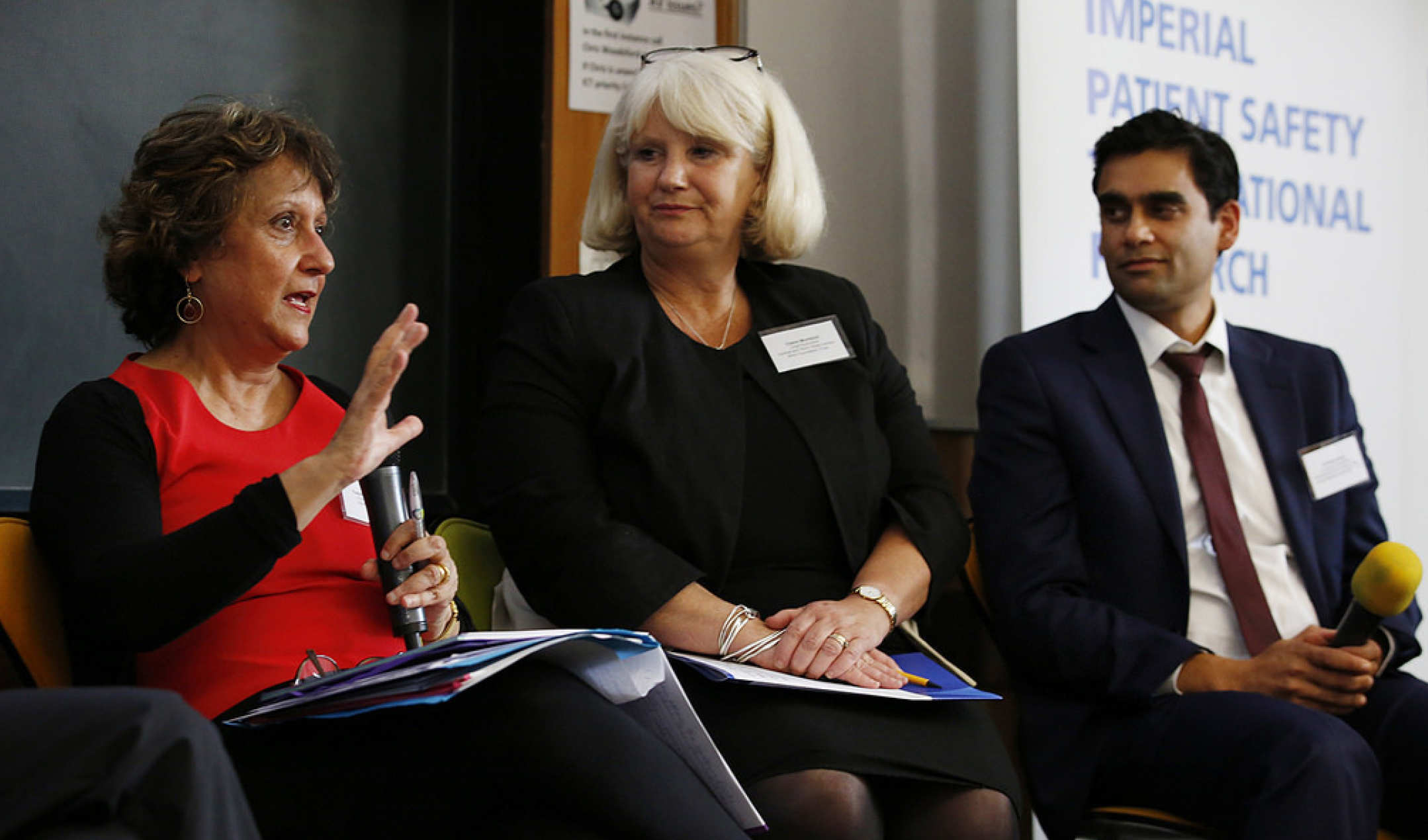by Jo Seed
A diverse range of patient safety experts, NHS health service providers and members of the public gathered for the NIHR Imperial Patient Safety Translational Research Centre (NIHR Imperial PSTRC)/Centre for Patient Safety and Service Quality (CPSSQ) annual symposium on 28th September 2016. The NIHR Imperial PSTRC, funded by the National Institute for Health Research (NIHR), is a partnership between Imperial College London and Imperial College Healthcare NHS Trust and comprises multidisciplinary teams of researchers working to improve patient safety in the NHS.
The symposium, now in its fourth year, aims to showcase examples of current research and to stimulate debate and discussion between researchers, healthcare professionals, members of the public and anyone with an interest in the safety and quality of healthcare.
Such diversity will be important to ensure that the NHS is safe for every patient”
Professor Ara Darzi
Director of NIHR Imperial PSTRC
Professor the Lord Ara Darzi, Director of the NIHR Imperial PSTRC, opened the Symposium by highlighting the Centre’s activities over the past year. This included co-hosting of the inaugural ministerial-level summit for patient safety and highlighting the broad portfolio of ongoing research. Professor Darzi closed his opening remarks by making the commitment to continue to support a wide range of research topics, he said: “Such diversity will be important to ensure that the NHS is safe for every patient.”
A wide array of speakers presented their research, including Dr Olga Kostopoulou, Reader in Medical Decision Making at Imperial College London, who talked about supporting diagnosis in primary care and ways to minimise diagnostic errors. Olga’s research shows that diagnostic-related incidents account for the highest proportion of severe harm to patients in primary care and highlighted the need to address the link between these errors and psychological harm to the patient.
Mr Guy Martin, Clinical Research Fellow at the NIHR Imperial PSTRC, went on to discuss the impact of digitalisation on care quality and patient safety. His research demonstrated that while digital systems and electronic records have massive potential to transform healthcare for the better, these systems can also cause patient harm. There are, however, ways in which to make changes for the better such as promoting a user-centred approach to product design and ensuring engagement of frontline clinicians. If this is done from the outset of product development it will ensure that clinicians’ needs are met, and will help rather than hinder them in delivering high-quality care – in order to mitigate the risks.
Martina Orlovic, a PhD student from the Centre for Health Policy within the Institute of Global Health Innovation, talked about estimating the incidence and the economic burden of obstetric patient safety incidents in the NHS. She was followed by Dr Emily Barrow, Clinical Research Fellow at the NIHR Imperial PSTRC, who asked the audience what ‘patient safety’ really meant to them. Emily’s research focuses on the potentially different views of patient safety from both patient and healthcare provider perspectives. Review of the literature has shown that in patient safety, healthcare professionals tend to focus on “failure”, “quantifiable events”, and “analysable issues/processes,” while patients focus on concepts related to care quality such as “interpersonal dynamics”. Meta-study and early outputs from qualitative interviews confirm this; patients found safety hard to define, but identified factors of importance to be; regular review, responsiveness of healthcare professionals to their needs and trust.
Research Fellow at the NIHR Imperial PSTRC, Dr Stephanie Archer, spoke about the PSTRC’s reasons for involving and engaging patients, carers and members of the public in research. Furthermore, she outlined exciting and forward-looking plans for the Centre in the next 6-12 months, under the coordination of Anna Lawrence-Jones, the Centre’s new Patient and Public Involvement and Engagement (PPIE) Manager.
The event also hosted a thought-provoking journalistic panel on patient safety and mental health, chaired by Yasmin Alibhai-Brown, a patient representative at the NIHR Imperial PSTRC. Members of the panel included Professor Louis Appleby, Professor of Psychiatry at the University of Manchester; Jane McGrath, CEO at the West London Collaborative; Dr Niraj Arora, Consultant Psychiatrist for Hammersmith and Fulham, West London Mental Health NHS Trust; and Claire Murdoch, Chief Executive for the Central and North West London NHS Foundation Trust.
A lively debate on the future of incident reporting systems, chaired by Professor Bryony Dean Franklin, the Chair of the Symposium and theme lead at the Centre, engaged the audience in a pre/post-vote of opinions. The proposing team – featuring Professor Brendan Delaney, Chair in Medical Informatics and Decision Making, and Chief Executive and Medical Director at Care IS, Dr Ian Rubin – put forth the argument that real-time data analytics and reporting and feedback systems will replace the current incident reporting platform as we know it, driving instantaneous learning and improvement. The opposing team – featuring Mr Erik Mayer, Clinical Senior Lecture and theme lead at the Centre, and James Titcombe, Patient Safety Specialist at Datix Ltd – put forth the opposing argument that “incident reporting is only going to disappear when we have error-free healthcare”. In a pre/post-vote by the audience, the opposing team won by a landslide.
The day ended with Jim Mackey, Chief Executive of NHS Improvement, who outlined the current state of patient safety in the NHS and plans for the future, answering questions from the audience, including one on building organisational resilience.
View the event photos here.
